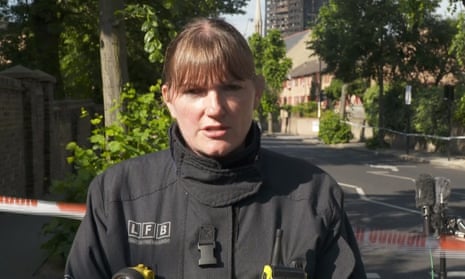The head of the London fire brigade has said that she is receiving counselling to deal with the trauma of the Grenfell Tower blaze.
In the immediate aftermath of the fire, which is believed to have killed about 80 people, Dany Cotton expressed concerns about the impact on the mental health of her firefighters, who battled through treacherous conditions in a desperate search for survivors.
On Monday, in an interview with Nick Ferrari on LBC radio, she revealed that she herself had sought help following the blaze.
“I happen to be having counselling myself,” said Cotton. “It’s really important; it’s something that people need to talk about and work through to try to stop them having problems in the future.
“One of the things I felt on the night was the overwhelming sense of responsibility because I was in charge and it was my firefighters at risk in the building, so that was an overwhelming sensation I never really experienced before, so it’s working through that for me.
“And also I was there for a long time. It’s trying to get your memory in the right order and work out what happened. But it’s something I am working through and I think it’s something important for everybody to recognise.”
Cotton, who attended the 1988 Clapham Junction train crash, in which 35 people died, just three months into her career as a firefighter, has described the Grenfell Tower fire as the worst blaze she has ever witnessed in her 29-year career. The fire at the west London residential block was eventually extinguished after about 24 hours. However, despite fears that the building might collapse, firefighters remained at the site for days searching for survivors and ultimately remains of those who perished.
Cotton said: “It’s OK not to be OK, and it’s really OK to talk about it … for some people it will trigger back memories from other incidents and for some people from previous jobs even. So, for me, the important thing is to keep talking about it, to seek professional help, to talk about it amongst your colleagues because it will be something that will affect people long into the future.”
London fire chief says she has received counselling in the wake of Grenfell in "very commendable" interview https://t.co/v7uR9THJMR
— LBC (@LBC) August 21, 2017
More than 250 firefighters were dispatched to the scene, a near-unprecedented number. Many were in tears as they left what remained of the tower block. All had a counselling assessment after finishing their shift at the tower and received follow-up phone calls. They were also offered further counselling.
Cotton said she felt “a responsibility for my firefighters. Their mental health and wellbeing is really key for me, we’re doing a massive amount of work with that”.
She said that such was the scale of the Grenfell Tower fire that the psychological impact would be felt far and wide and urged anyone affected to seek help.
“There will be lots of people who’ll have been affected by it, people who’ll have seen it on the television, people who lived in the local area, you know?” she said. “And the whole mental health aspect is something that it’s really important that we deal with now.”
A recent report by the Chief Fire Officers’ Association found 41,000 shifts a year were lost in England and Wales due to mental health issues suffered by firefighters.
Dr Jill Tolfrey, the chief executive of the Fire Fighters Charity, praised Cotton for her comments. “It’s great that Dany Cotton is continuing to raise awareness about mental health by sharing her own experiences and focusing on this in her role as London fire commissioner,” she said.
“Providing mental health support to serving and retired fire service personnel is a priority for the Fire Fighters Charity, and we will continue to work with fire and rescue services across the UK to raise awareness about mental health and ensure that their staff are aware of the support that is available to them through our charity.”
LFB has its own in-house counselling and welfare team, which was reinforced by support from the NHS and other fire and rescue services in the aftermath of the Grenfell fire.






